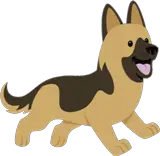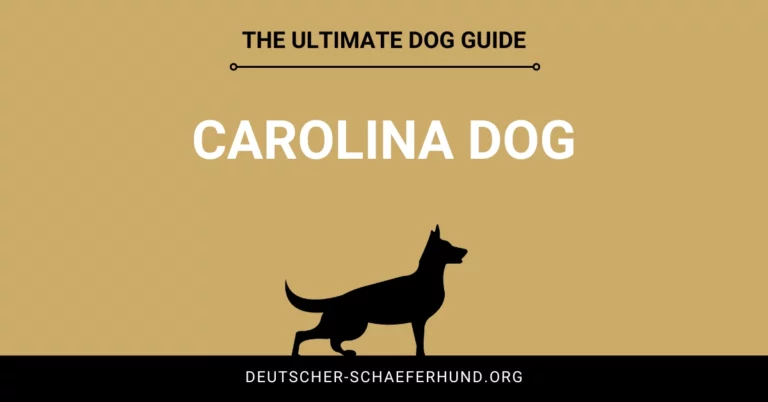Introduction
The Carolina Dog is a unique breed that has captured the fascination of many. These medium-sized dogs are known for their distinctive appearance, wild heritage, and natural survival instincts. They are sometimes referred to as American Dingoes due to their resemblance to the Australian Dingo. These dogs are not just pets but a link to a time when dogs were wild creatures, surviving on their own in the American South. Their survival instincts and intelligence make them unique in the world of domestic dogs.
| Feature | Description |
|---|---|
| Breed Name | Carolina Dog |
| Origin | United States |
| Size | Medium |
| Weight | 30 to 55 pounds |
| Height | 17 to 24 inches |
| Life Span | 12 to 15 years |
| Coat Color | Tan, Yellow, Black, Cream, Off-White |
| Temperament | Intelligent, Independent, Reserved |
| Exercise Needs | High |
| Diet | A balanced diet suitable for a medium-sized dog with moderate activity level |
| Health Concerns | Generally healthy breed; some may be prone to hip dysplasia, heart disease, and certain types of cancer |
| Good with Children and Other Pets | Yes, with early socialization |
| Living Environment | Adaptable to various living situations, provided they get enough exercise and mental stimulation |
History of Carolina Dogs
Origin and Ancestry
The Carolina Dog’s lineage can be traced back to ancient canines that roamed Asia and North America. They are believed to have crossed the Bering Land Bridge along with the first human settlers.
Discovery and Recognition by the Scientific Community
They were rediscovered in the 1970s by Dr. I. Lehr Brisbin Jr., a biologist at the Savannah River Ecology Lab. Brisbin recognized their unique characteristics and worked to get them recognized as a distinct breed.
Role in Indigenous Cultures
Ancient native tribes often depicted Carolina Dogs in their art. The dogs were a significant part of these cultures due to their hunting skills and companionship.
Current Status and Population
Today, the Carolina Dog is a recognized breed by the United Kennel Club and the American Rare Breed Association. Their population is relatively small compared to other dog breeds, which adds to their uniqueness.
Physical Characteristics of Carolina Dogs
Size and Weight
A typical Carolina Dog stands about 17 to 24 inches tall at the shoulder and weighs between 30 to 55 pounds.
Coat and Color
Their coat is short to medium in length, often described as dense and harsh. The most common colors are variations of tan and yellow, although black, cream, and off-white are also seen.
Distinguishing Features
Carolina Dogs have a wedge-shaped heads, almond-shaped eyes, large, erect ears, and a curved tail – all traits that hint at their wild ancestry.
Temperament and Behavior of Carolina Dogs
General Temperament
Carolina Dogs are known for their intelligence, independence, and sometimes reserved nature. They can be wary of strangers but are usually loyal and affectionate with their families.
Interaction with Humans
Carolina Dogs often form a strong bond with their human companions. They enjoy participating in family activities and can make excellent companions.
Interaction with Other Animals
They typically get along well with other dogs, particularly when socialized from an early age. Their prey drive may make them chase smaller animals, though this can be managed with training and socialization.
Natural Instincts and Behaviors
Their instincts include digging dens and hunting small game. These behaviors, while part of their charm, can be challenging in a domestic setting and must be managed responsibly.
Health and Longevity of Carolina Dogs
Lifespan and Aging
The Carolina Dog generally lives between 12 to 15 years. They age gracefully and remain active well into their senior years.
Common Health Issues
They are generally healthy dogs with few breed-specific ailments. But like all breeds, they can be prone to general canine health problems like hip dysplasia, heart disease, and certain types of cancer.
Preventive Care and Treatments
Regular veterinary check-ups, a balanced diet, and sufficient exercise can go a long way in keeping a Carolina Dog healthy.
Care and Maintenance of Carolina Dogs
Nutritional Needs
They need a balanced diet, ideally, one formulated for medium-sized dogs with a moderate activity level.
Exercise Requirements
Carolina Dogs are active and require regular exercise to keep them physically fit and mentally stimulated. Long walks, playtime in the yard, and mentally stimulating games are all beneficial.
Grooming and Hygiene
Their coat is relatively low maintenance. Regular brushing will help to control shedding and keep the coat healthy. Regular dental hygiene, nail trims, and ear checks are also important for overall health.
Mental Stimulation and Enrichment
These intelligent dogs appreciate mental stimulation. Training, puzzle toys, and interactive games can help keep their minds sharp.
Training and Socialization of Carolina Dogs
Puppy Socialization
Socialization from a young age is crucial for a Carolina Dog. Introducing them to a variety of people, animals, and experiences can help them grow into well-rounded adults.
Obedience Training
Training should be a mix of positive reinforcement techniques. Remember, patience and consistency are key when training this independent breed.
Behavioral Training
Addressing any problematic behaviors early can prevent them from becoming ingrained habits. If necessary, don’t hesitate to seek help from a professional dog trainer.
Advanced Training Options
Carolina Dogs can excel in advanced training and dog sports, such as obedience competitions, agility, and even search and rescue work.
Carolina Dogs and Families
Suitability for Families with Children
They usually do well with children, particularly if they are raised together. Supervision is always recommended when dogs and young children are together.
Suitability for Families with Other Pets
Their natural pack instincts mean they often do well in homes with other dogs. Early socialization is key when introducing them to homes with cats or other small pets.
Adaptability to Different Living Environments
While they love having space to run and explore, Carolina Dogs can adapt to various living situations, provided they get enough exercise and mental stimulation.
Breeding and Preservation of Carolina Dogs
Breeding Considerations and Challenges
Breeding Carolina Dogs should be left to responsible breeders who understand the breed’s history, temperament, and health issues.
Preservation Efforts and Conservation Status
As a breed, the Carolina Dog is not currently at risk. However, preservation efforts by breed clubs and enthusiasts aim to maintain the breed’s unique characteristics.
Role of Breed Clubs and Organizations
Several clubs and organizations are dedicated to the Carolina Dog. They provide resources for owners, breeders, and those interested in the breed.
Carolina Dogs in the Media
Representation in Movies and Television
The Carolina Dog may not be as popular in the media as some other breeds, but they’ve had their fair share of screen time. Their unique appearance and intelligent nature make them captivating subjects in documentaries and other programs exploring canine history and behavior.
Popular Carolina Dogs on Social Media
With the rise of social media, several Carolina Dogs have gained a following for their charming antics and appealing looks. Social media platforms like Instagram provide an opportunity for owners to share their Carolina Dog’s daily life and also raise awareness about the breed.
The Future of Carolina Dogs
Prospects and Challenges
The future for Carolina Dogs looks promising. Interest in the breed continues to grow, and their unique characteristics make them appealing to a diverse group of dog enthusiasts. However, as with any breed, there are challenges to ensure that breeding maintains the breed’s health and distinct qualities.
Role of Technology in Breed Preservation
Advancements in genetic testing and veterinary care offer new possibilities for preserving and understanding the Carolina Dog. These technologies can help breeders make informed decisions and provide better care for these unique canines.
Conclusion
In conclusion, the Carolina Dog is a unique, intelligent, and versatile breed with a rich history and many admirable qualities. If you’re looking for a loyal and adaptable companion with a touch of the wild, this breed might just be the one for you.



